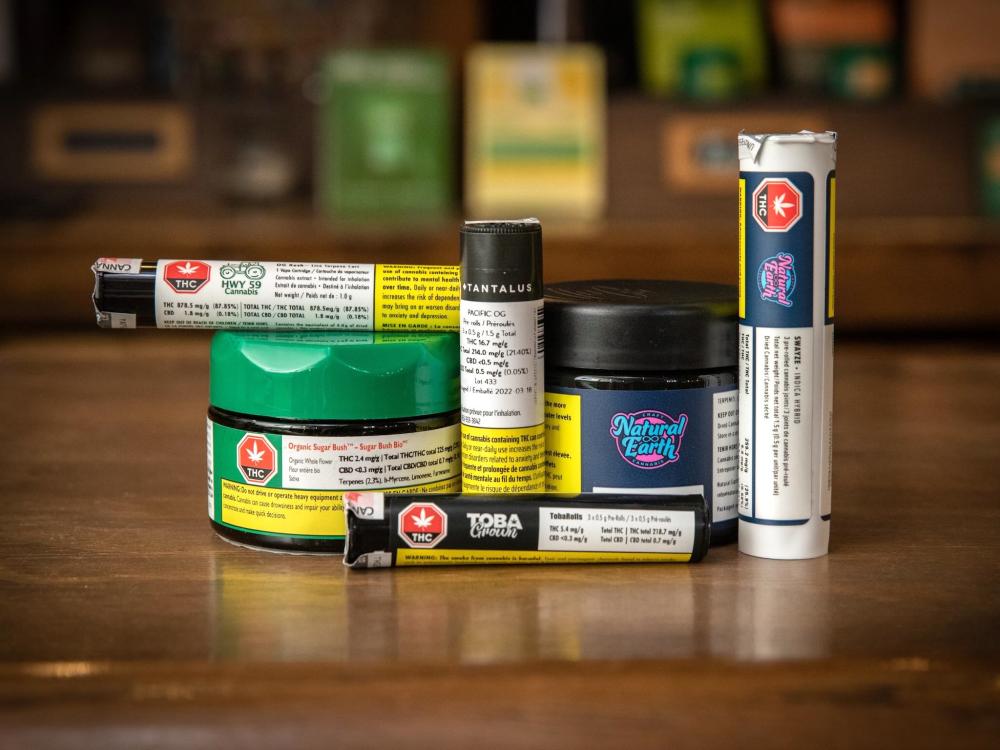Cannabis industry ‘a very compliant group,’ provincial authority says
Read this article for free:
or
Already have an account? Log in here »
To continue reading, please subscribe:
Monthly Digital Subscription
$0 for the first 4 weeks*
- Enjoy unlimited reading on winnipegfreepress.com
- Read the E-Edition, our digital replica newspaper
- Access News Break, our award-winning app
- Play interactive puzzles
*No charge for 4 weeks then price increases to the regular rate of $19.95 plus GST every four weeks. Offer available to new and qualified returning subscribers only. Cancel any time.
Monthly Digital Subscription
$4.99/week*
- Enjoy unlimited reading on winnipegfreepress.com
- Read the E-Edition, our digital replica newspaper
- Access News Break, our award-winning app
- Play interactive puzzles
*Billed as $19.95 plus GST every four weeks. Cancel any time.
To continue reading, please subscribe:
Add Free Press access to your Brandon Sun subscription for only an additional
$1 for the first 4 weeks*
*Your next subscription payment will increase by $1.00 and you will be charged $16.99 plus GST for four weeks. After four weeks, your payment will increase to $23.99 plus GST every four weeks.
Read unlimited articles for free today:
or
Already have an account? Log in here »
The provincial body that oversees the cannabis industry issued 97 “verbal cautions” and 28 warning letters to Manitoba retailers in the past two fiscal years over regulatory breaches found by inspectors.
In six cases, officials from the Liquor, Gaming and Cannabis Authority of Manitoba met with weed-store management to discuss regulatory concerns that were found.
The regulator has, however, issued just three compliance orders — binding directives that carry the weight of the Liquor, Gaming and Cannabis Control Act that must be addressed, but can be appealed — to retailers in the seven years since the federal government legalized recreational cannabis in 2018.

One of the three orders, ironically, was about the improper sale of liquor at an event in a cannabis store. In that case, the licensee, Cannabudz Inc., was ordered to pay a $2,542 fine for selling booze at Atomic Flower, a Portage Avenue shop, during the 2022 evening affair.
“The cannabis industry for us, they have a very high compliance rate,” said Amanda Creasy, head of public affairs at the LGCA, which also regulates the sale of alcohol and the gambling and horse racing industries.
“Of all of our industries, they actually probably have the highest compliance rate.”
Creasy tied the Manitoba industry’s general regulatory fastidiousness to the fact its product was long illegal.
“They’re an interesting group because there’s still so much stigma attached to them… a lot of people are still a bit uneasy about the products,” she said recently.
“But for us overall, in the scope of all the different industries we work with and the things we see… they’re a very compliant group.”
She said the regulatory body uses what it calls a “progressive discipline model” when its inspectors discover breaches.
At first, the LGCA provides information and training on the regulations, then issues cautions and warning letters before escalating issues to management at a given retailer.
It’s only in rare cases that breaches are referred up the chain to the LGCA’s executive director, who has the authority to issue formal compliance orders under provincial cannabis sales law. Those orders can include fines or revoke retail licences.
In 2024-25 the authority conducted 1,160 inspections of the province’s 230 weed retailers, 1,198 audits and investigated 53 requests for new licences, its latest annual report says.
Creasy said those inspections can take different forms, with inspectors occasionally popping in unannounced or without identifying themselves; on other occasions, they’ll meet with staff and management.
The regulator also launched “a minors as agents” program in the last fiscal year, in which people under the age of 19 are directed to try purchasing pot products, on behalf of the LGCA, to ensure shops are checking ID and not selling to underage customers.
The LGCA sent out young agents 167 times. Retailers were found to have breached the legislation 25 times, all of which resulted in written warnings and what the regulator called “an education session.”
The regulator recently provided data on its enforcement measures to the Free Press after rejecting a freedom-of-information request filed earlier this year that sought access to its inspection reports dating back to the beginning of legalization.
The Free Press sought the internal documents to better understand how the relatively new industry is overseen by officials, as marijuana shops continue to proliferate in the province like weeds.
The authority argued granting access to the reports would allow the public — and industry — to “reverse engineer” the LGCA’s compliance programs and refused access. The Manitoba Ombudsman’s office upheld the refusal.
But Dean Beeby, a longtime Canadian freedom-of-information researcher and journalist, called that argument a stretch, arguing cannabis retail inspections should be truly random — and therefore unpredictable.
He argued withholding the LGCA’s inspection reports makes the agency less accountable, creating greater risk for consumers.
“Cannabis is a consumer product, and consumers need to know how effectively the LGCA is carrying out its work,” he said.
erik.pindera@freepress.mb.ca

Erik Pindera is a reporter for the Free Press, mostly focusing on crime and justice. The born-and-bred Winnipegger attended Red River College Polytechnic, wrote for the community newspaper in Kenora, Ont. and reported on television and radio in Winnipeg before joining the Free Press in 2020. Read more about Erik.
Every piece of reporting Erik produces is reviewed by an editing team before it is posted online or published in print — part of the Free Press‘s tradition, since 1872, of producing reliable independent journalism. Read more about Free Press’s history and mandate, and learn how our newsroom operates.
Our newsroom depends on a growing audience of readers to power our journalism. If you are not a paid reader, please consider becoming a subscriber.
Our newsroom depends on its audience of readers to power our journalism. Thank you for your support.


